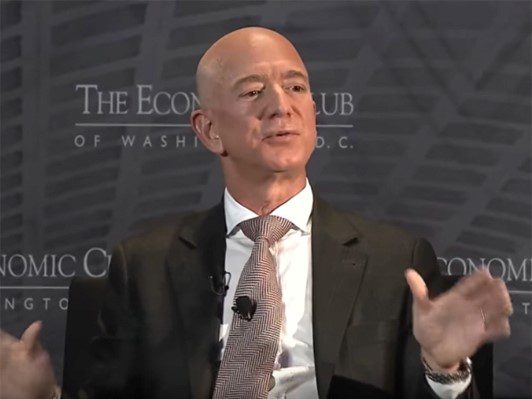
It’s not every day you get to see Jeff Bezos speak, but I was lucky enough to be on hand Thursday when the Amazon Founder and CEO addressed a packed house hosted by The Economic Club of Washington DC.
In a wide-ranging interview by David Rubenstein, Co-Founder and Co-Executive Chairman of The Carlyle Group, Bezos hit on a variety of topics, including telling the audience that he’d soon announce the location of Amazon’s second headquarters.
Bezos was extremely impressive, and it’s worth watching the full video, below. He shows great humility and stressed how he still tries to run Amazon like a small company. Here are a few things I found particularly interesting:
On the future economy and his legacy. Bezos was asked whether he intends to give his vast fortune to charity, and while he responded by saying that the $2 billion education and anti-poverty programs he announced yesterday were just a small start, he plainly said that the vast majority of his fortune would be “invested” in Blue Origin, which he sees as tackling an existential human challenge (100-200 year time-frame) of earth overpopulation and energy shortfall/over-consumption.
He believes he was able to succeed at Amazon because of the infrastructure laid down before him: the Internet and package distribution capabilities of UPS and FedEx. He wants to provide the same infrastructure for the space economy, and considers this to be his most important work.
“If I can’t make Blue Origin a for-profit thing, maybe I’ll convert it to non-profit some distant point in the future, but I wouldn’t want that,” Bezos said. “I want it to be a thriving ecosystem more like UPS and FedEx.” Toward that end, this report by Morgan Stanley today highlights this opportunity from an investment and future business standpoint.
On the role of the CEO. Jeff insists on eight hours of sleep and doesn’t do any meetings before 10 am, and purposely schedules high intellect-demanding meetings before lunch. As organizations grow, scale and gain infrastructure, he believes that CEOs add value by making a few high value decisions.
“As a senior executive, you get paid to make a small number of high-quality decisions. Your job is not to make thousands of decisions every day. Is that really worth it if the quality of those decisions might be lower because you’re tired or grouchy?”
Bezos concluded that it’s “enough” for him to make around three good decisions every day (and that Warren Buffett told him he only makes 3 big decision a year that matter).
On the importance of site selection. Jeff moved to Seattle from New York City with his new wife specifically to launch Amazon. He saw Seattle as the place where he could recruit good tech talent specifically from Microsoft, and that was central to his success.
On growing employee productivity. In the early days of Amazon (which Bezos insisted seemed like just yesterday) he would do package assembly and post office runs himself. Assembling packages on the floor on hands and knees with another guy, he looked up and said, “We could really use some knee pads.” The other guy responded, “Actually, we could really use a packing table.” Bezos bought one and their productivity immediately shot up.
Read more: States Scramble as Amazon Announces Search for a Second U.S. Headquarters
Chief Executive Group exists to improve the performance of U.S. CEOs, senior executives and public-company directors, helping you grow your companies, build your communities and strengthen society. Learn more at chiefexecutivegroup.com.
0

1:00 - 5:00 pm
Over 70% of Executives Surveyed Agree: Many Strategic Planning Efforts Lack Systematic Approach Tips for Enhancing Your Strategic Planning Process
Executives expressed frustration with their current strategic planning process. Issues include:
Steve Rutan and Denise Harrison have put together an afternoon workshop that will provide the tools you need to address these concerns. They have worked with hundreds of executives to develop a systematic approach that will enable your team to make better decisions during strategic planning. Steve and Denise will walk you through exercises for prioritizing your lists and steps that will reset and reinvigorate your process. This will be a hands-on workshop that will enable you to think about your business as you use the tools that are being presented. If you are ready for a Strategic Planning tune-up, select this workshop in your registration form. The additional fee of $695 will be added to your total.

2:00 - 5:00 pm
Female leaders face the same issues all leaders do, but they often face additional challenges too. In this peer session, we will facilitate a discussion of best practices and how to overcome common barriers to help women leaders be more effective within and outside their organizations.
Limited space available.

10:30 - 5:00 pm
General’s Retreat at Hermitage Golf Course
Sponsored by UBS
General’s Retreat, built in 1986 with architect Gary Roger Baird, has been voted the “Best Golf Course in Nashville” and is a “must play” when visiting the Nashville, Tennessee area. With the beautiful setting along the Cumberland River, golfers of all capabilities will thoroughly enjoy the golf, scenery and hospitality.
The golf outing fee includes transportation to and from the hotel, greens/cart fees, use of practice facilities, and boxed lunch. The bus will leave the hotel at 10:30 am for a noon shotgun start and return to the hotel after the cocktail reception following the completion of the round.